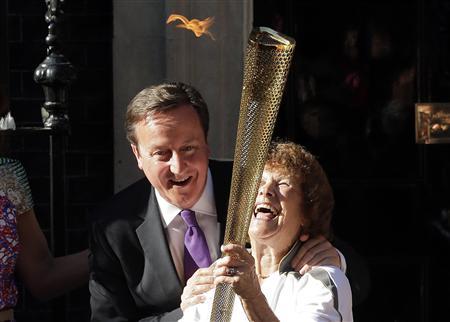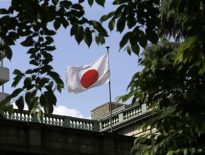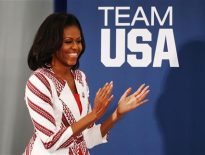(Reuters) – Bells rang out across Britain on Friday to signal the final countdown to the Olympic Games, which open with an exuberant and eccentric ceremony celebrating the nation in an explosion of dance, music and fireworks inspired by Shakespeare’s “Tempest”.

The three-hour showcase created by Oscar-winning “Slumdog Millionaire” director Danny Boyle takes spectators on a journey from Britain’s idyllic countryside through the grime of the Industrial Revolution and ending in an explosion of pop culture.
Watched by 60,000 people at the main Olympic stadium built in a run-down part of east London and a global audience of more than a billion, the event will have passages described by British Prime Minister David Cameron as “spine-tingling”.
The spectators will be urged to join in sing-a-longs and help create spectacular visual scenes at an event that sets the tone for the sporting extravaganza, when 16,000 athletes from 204 countries share the thrill of victory and despair of defeat with 11 million visitors.
The Games will also answer the question on Britons’ lips — were seven years of planning, construction and disruptions, and a price tag of $14 billion during one of the country’s worst recessions, actually worth it?
“There is a huge sense of excitement and anticipation because Britain is ready to welcome the greatest show on Earth,” said Cameron. “This is a great moment for our country so we must seize it.”
There have, however, been bumps along the way.
Media coverage was until recently dominated by security firm G4S’s admission that it could not provide enough guards for Olympic venues. Thousands of extra soldiers had to be deployed at the last minute, despite the company’s multi-million-dollar contract from the government.
Counter-terrorism chiefs have played down fears of a major attack on the Games, and Cameron said that a safe and secure Olympics was his priority.
“This is the biggest security operation in our peacetime history, bar none, and we are leaving nothing to chance.”
Suicide attacks on London in July, 2005, killed 52 people. This year the Games coincide with the 40th anniversary of the 1972 Munich massacre when 11 Israeli Olympic team members were killed by Palestinian militants.
Calls for an official commemoration of the tragedy at the opening ceremony have so far been refused.
Heavy traffic in central London and severe delays on Britain’s creaking train system have added to the grumbling.
A series of doping scandals have tarnished the Games’ image in the buildup, with at least 11 athletes banned so far, and Greek triple jumper Paraskevi Papachristou became the Olympics’ first “twitter victim” when she was withdrawn from the team over tweeted comments deemed racist.
An early diplomatic faux pas, when the flag of South Korea appeared at a women’s soccer match between North Korea and Colombia, prompted fuming North Korean players to walk off the pitch and delayed kick-off by more than an hour.
SATANIC MILLS
All of that is likely to be forgotten as attention around the globe turns to the opening ceremony, which begins at 2000 GMT and ends more than three hours later.
While Boyle has urged the 10,000 participating volunteers and large crowds at rehearsals this week to keep the show a secret, some elements are already in the public domain.
Titled “Isles of Wonder”, it opens with a recreation of bucolic bliss, complete with fields, hedges, sheep, geese, a shire horse, shepherdesses and even a game of village cricket.
The mood then darkens as “England’s green and pleasant land”, from a poem by William Blake, makes way for the sooty chimneys and smoking steel works of the “dark Satanic Mills”, evoking the 19th century urban settings of Dickens.
Stirring music from Britain’s past and present provides the soundtrack, which comes to the fore in the latter stages with a psychedelic celebration of pop culture including songs, sitcoms and cinema classics.
Cyclists with illuminated “wings” circle the arena, creating a stunning effect for cameras suspended from the stadium roof.
Boyle’s ode to the National Health Service, a politically charged topic in Britain where people are emotionally tied to the ideal of a welfare state, may make less sense to people watching from afar.
But a closing performance by ex-Beatle Paul McCartney should have global appeal for a ceremony that will contrast sharply with Beijing’s tightly choreographed, large-scale version.
Boyle had 27 million pounds ($42 million) to spend on his spectacular, well under half the amount estimated to have been spent in China in 2008.
There are still plenty of secrets, including who will have the honor of lighting the Olympic cauldron, the moment symbolizing the opening of the Games and ending the Olympic torch’s 8,000-mile journey the length and breadth of Britain.
On Friday, the torch made its way up the River Thames aboard the royal barge Gloriana, which was used in Queen Elizabeth’s Diamond Jubilee in June.
The 86-year-old monarch will be in the crowd, along with U.S. First Lady Michelle Obama and a host of dignitaries and celebrities.
BOLT OR BLAKE?
The first main day of sport is Saturday, when Briton Mark Cavendish is favorite to win gold in the road race in what would be the perfect start for the home nation, and would come hot on the heels of Bradley Wiggins’ win at the Tour de France.
Britain’s hopes are high overall after a successful Games in Beijing, although the United States, China and Russia could dominate the medals table yet again.
The highlight of the Games is the men’s 100 meters final, traditionally the blue riband event of the Games, with Jamaican Usain Bolt’s domination of the discipline under threat from training partner and compatriot Yohan Blake.
Bolt, fastest man on earth, is vying to do what no man has done before — successfully defend the 100m and 200m Olympic titles, and, despite fitness concerns, he is talking tough.
“For me, it is all about the win,” he told Reuters in an interview. “I am not really worried about a world record now. “And I am going out there (to) get it done.”
If Bolt and Blake make the final, the August 5 race will rival the Carl Lewis-Ben Johnson clash at the 1988 Seoul Olympics for drama and excitement.
U.S. swimmer Michael Phelps will also be looking to cement his place as the world’s greatest swimmer by adding to the eight gold medals he won in Beijing.
(Additional reporting by Stephen Addison, Gene Cherry, Guy Faulconbridge, Vincent Fribault, Peter Griffiths, editing by Peter Millership)





